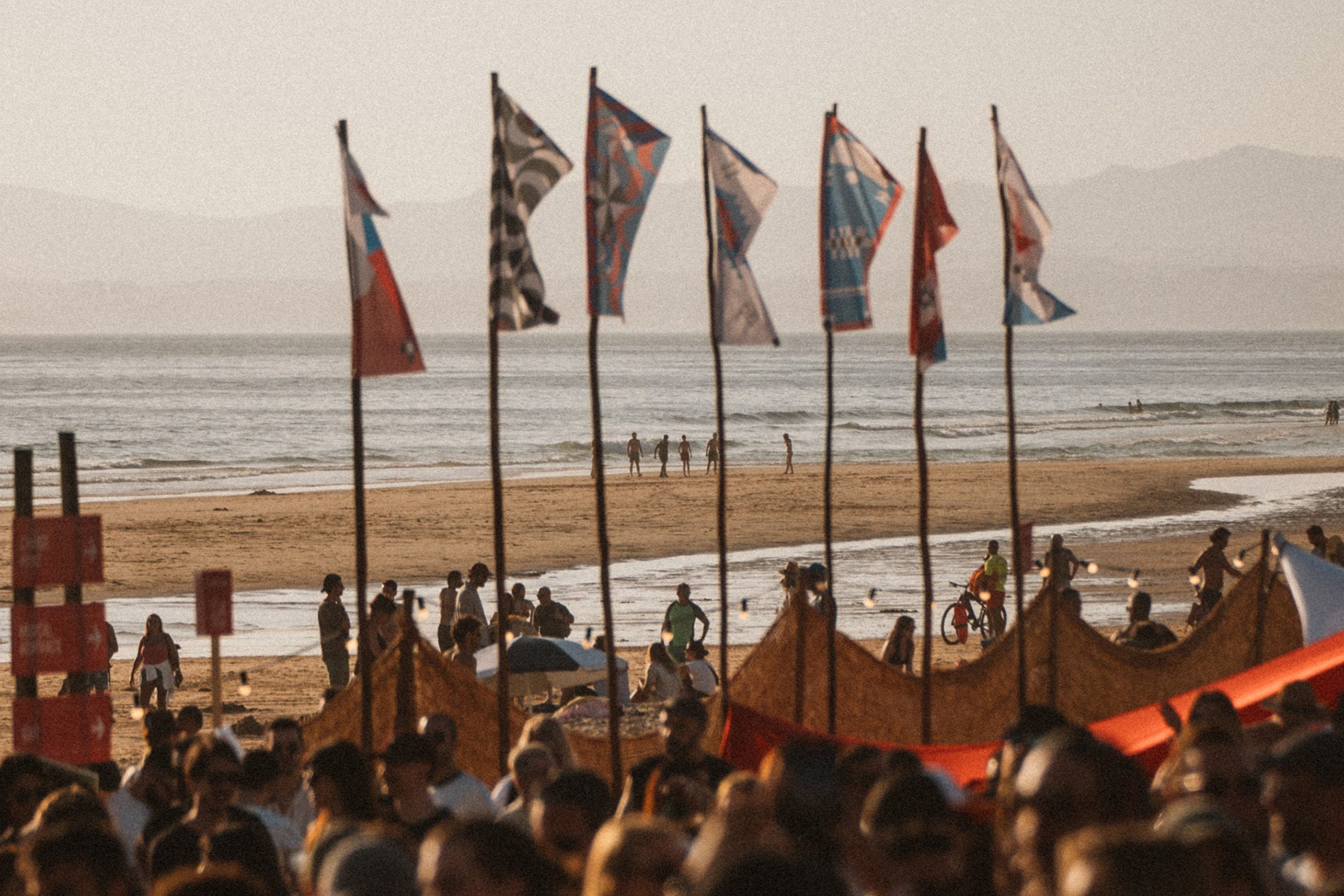 Features
Features
People at the centre: MOGA 2024 was so much more than sun, sea, sounds and scenery
Endless beaches and once-in-a-lifetime sunsets have made it a must for free-spirited electronic fans — Belle Richardson heads to Portugal to find out if MOGA maintains the Bohemian energy it has become renowned for as it debuts its own, self-contained festival site
"Do you know where the name MOGA comes from?" asks festival founder Matthieu Corosine with a glimmer in his eye. “It comes from Mogador, it's the name Essaouira was given by the Portuguese."
This tender tie between Morocco and Portugal, bridged by MOGA, now seems to be firmly woven into the very fabric of the festival. Having held its first edition in 2016 in Essaouira, Morrocco; a quiet seaside town with a hidden bohemian heritage that attracted the likes of Jimi Hendrix, Cat Stevens, and Frank Zappa to party amongst the surfers and hippies who gathered there in the '60s. A fitting location for MOGA, a festival which continues to pay homage to its North African origins even now it has switched continents. Morrocan rugs lie on the Portuguese sands, under intricate Arabic lanterns — sunsets remain just as important to its free-spirited crowd as DJ sets.
Corosine and his fellow organisers decided to move their festival to Caparica following the COVID-19 pandemic in 2021, taking a gamble on its devotees being just as enamoured with Lisbon's expansive golden beachfront as they were with the white sand beaches of "Mogador." Just twenty minutes from one of Europe’s most beloved cities – favoured by nomadic youth for its art and culture – it's obvious to see why MOGA's founders first felt inspired to journey to Caparica’s sprawling desert-like beaches.
Read this next: Sandbox is leading the charge for Egypt's newly burgeoning dance music era
Despite this seemingly preordained connection, the move remains a bold one at a time when more festivals than ever are struggling to survive among rising financial costs and dwindling crowds. Against the odds, the risk appears to have paid off for MOGA — a testament to the intuition of its organisers. Infusing its Moroccan/French roots with the electric youthful culture of Portugal, MOGA seemingly moves from strength to strength, continuing to build a name for itself internationally for its poignant soul, high-value production, bohemian crowds and quality line-ups.
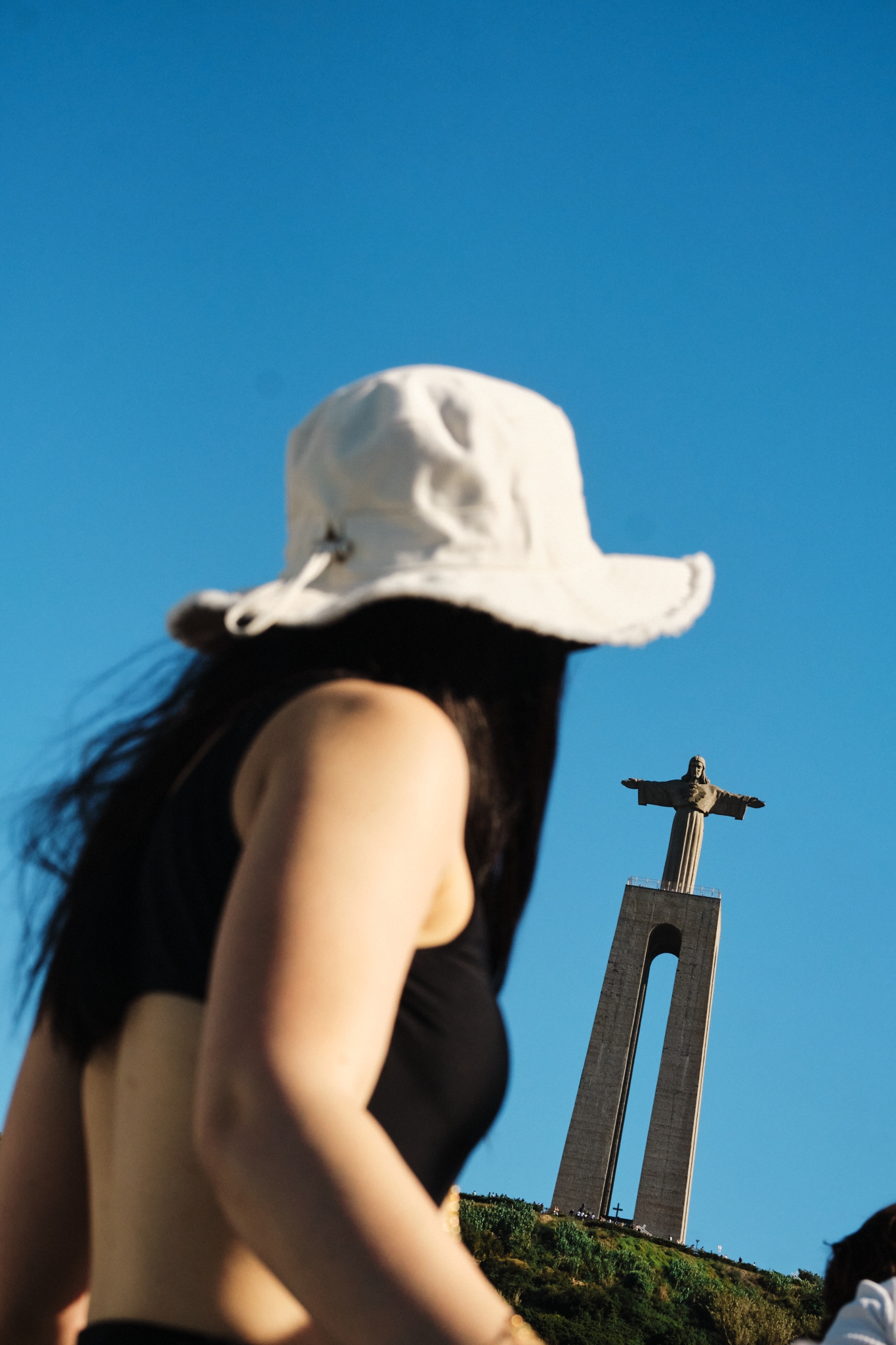
Today, MOGA takes the shape of an intimate yet international electronic music festival, combining beautiful natural settings, high-value line-ups and wellness activities such as surfing, yoga, food, art and talks. The beach-based, sunset-soaked festival continues to host events in Morocco as well, with a MOGA set to take place in Essaouira this October, the place where it all began. Fans of MOGA remain ardent in its offering, as one young attendee tells me on the approach: “There’s no festival like it”. With a reputation like this, it’s no surprise many within the crowd revealed they were attending their second or third edition this year.
Returners know what to expect from a MOGA line-up. With previous editions including Jayda G, Kerri Chandler, Jimi Jules, Lovefingers and Rafael Da Cruz — this year's offering delivers a stellar electronic offering that rivals some of its larger competitors, without compromising on the treasured intimacy of smaller festivals. Making their MOGA debut this year are Dixon, afro-house aficionado Francis Mercier, rising French deep house artist Alex Wann, Dekmantel Soundsystem as well as returners, eclectic legend Acid Pauli, Atlassi, Retro Casseta, Pachanga Boys, Satori, Xinobi and Acid Arab.
As we draw closer to Praia de Morena on Friday evening, a parade of cars kick-up dust along the long, unlit roads. Out in this darkness, the soft glow of the festival appears on the horizon, shimmering in the evening light like a half-buried jewel. Getting out to walk on foot, festivalgoers descend towards it like moths and as a host of euphoric melodies slow out of the windows of passing cars. Upon entering the festival on the first night, the excitement in the air is tangible. It’s possible this frenetic energy was, in part, a response to the structural changes taking place at this year’s edition of MOGA; the festival is departing from its previous multi-venue format, instead having developed a fully-fledged festival site. As a result, MOGA has doubled its capacity — now expected to host 25,000 attendees across its sandy expanse.
The brand-new festival site consists of three stages on the banks of Praia de Morena’s seemingly endless stretch of wild blue ocean – its serenity is undercut by the general buzz of the festivalgoers, many of whom are adorned with glitter and gold clothing. Large crowds gather at the two many stages, evenly spread across the sand and eagerly engaging with those around them. Between the stages and stalls, there were pockets of decorative rugs punctuated by Moroccan floor cushions, umbrellas and lanterns, under which clusters of revellers gathered to shelter from the sun and sound.
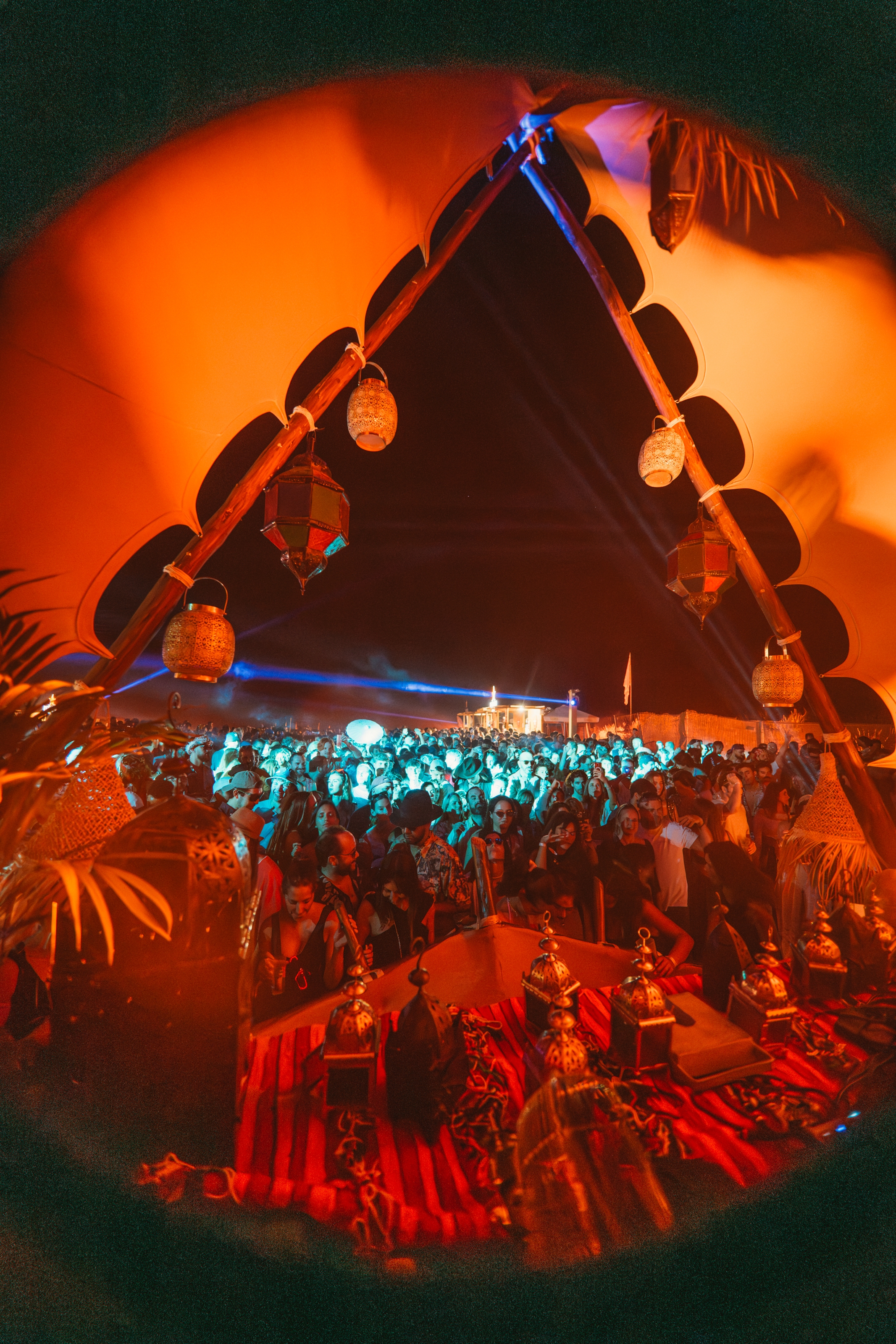
Over on the main DOUKKALA stage, DESIREE masterfully manoeuvred the transition from day into night with grace, taking the crowd on a journey with a mixture of crowd challengers and pleasers with refreshing unreleased mixes of beloved classics such as Cher’s ‘Believe’, as well deep afro-house cuts. DESIREE finalised her stunning set with Franky & Sandrino’s ‘Memories’ which seemed to make her hypnotised audience melt into mental euphoria. Andhim bridged DESIREE’s dusk performance with their own brand of House driving the energy into Dixon’s set, which deconstructed the night into breakbeat-heavy tracks.
The infamous sounds of ‘Bamboleo’ played in several sets across the weekend with many of the acts opting for Latin and Afro house-inspired selections — an appropriate choice for the scenic setting. Though it’s hard to argue against the seductive sounds of afro house and the melodic emotion of minimal deep house and disco, a broader selection of genres would only serve to make those genres shine in their opportune moments. Numbers in the crowds nearly doubled from Friday to Saturday as hoards of sandy steppers were drawn towards the SQUALA stage for Acid Pauli, who opened with piano house before descending into dark heart thumping, spine-tingling acid which resonated far and wide from the funktion one speakers.
Read this next: The body and beat: Guedra Guedra's unique music is inspired by the rhythms of life in Africa
As temperatures dropped the flow of people moved to the DOUKKALA stage where Paso Doble warmed up a lightly chilled crowd with minimal melodic jazz house for the last golden hours of sunset before the energetic Alex Wann’s electric set set fire to the night. Crowds felt denser and more frantic on the second night and the festival collectively seemed to peak in energy as the dynamic adjusted into the more bustling climate.
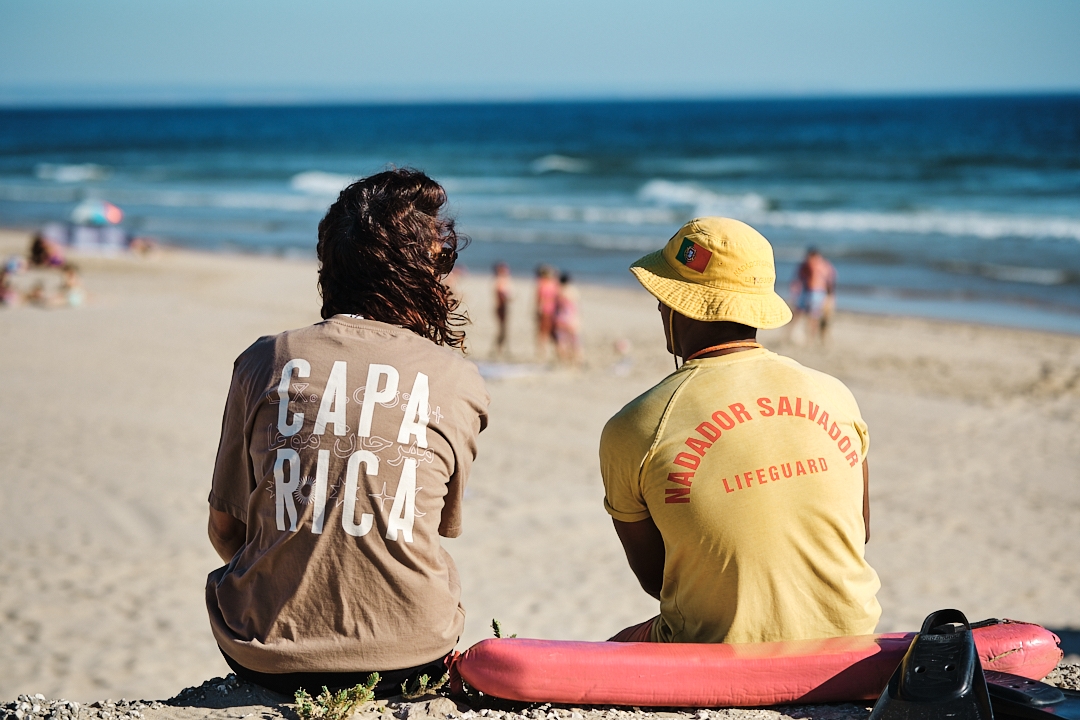
In comparison, by the third night, crowds had dwindled somewhat, perhaps opting for a day party or to see out the rest of their "Sunday Scaries" at home. Despite this, sun-swept and still dancing, what began as a modest crowd, swiftly grew as the sweet sounds of Palms Trax lured the desert dancers from their dunes. Easing in with saxophone-laced piano house, Palms Trax journeyed through an emotive selection of tracks. Opting for a mostly laid-back set, the German DJ played deep house and soulful cuts, sprinkling disco and Latin tunes between and ending on a poignant unreleased mix of Bill Withers’ ‘You Can’t Just Smile It Away’ that had his audience slow-dancing as the day slipped into the night. Agoria marched crowds over the finish line with trumpets dissolving into progressive, melodic psychedelic sounds. The transition from multi-venue to single site appears to have gone ahead with little difficulty, at least from the perspective of the festival goers. However, the ambitious plan to unite two beach clubs on the Praia de Morena stretch was met with some pushback from local councils resulting in a stretch of "unclaimed" land between the two beach stages in which festivalgoers were required to scan in and out using their wristbands. To the average attendee, this system of clocking in and out to the venues might have seemed unnecessary but thanks to the well-staffed security checkpoints, it did little to disrupt the flow of crowds between the stages as they passed through mostly without complaint.
The festival site is a little way along the most accessible stretch of beach in Caparica. With most accommodation options located a 10-minute cab away, the location of the festival resulted in partial traffic on the approach to the beach as well as some difficulty getting home in the AM. This wouldn’t be a problem for most of the festival goers based in Lisbon who seemed to opt for a day ticket and were most likely heading home to the comfort of their own beds after a day of dancing in the sun. However, for those travelling from further afar, holed up in local hotels and Airbnb, a shuttle bus may be optimal for a smoother experience at future editions. A little bit of traffic is a small price to pay for the unique location of the festival, which bears witness to sunsets so stunning that festival goers often stood stopped in their tracks watching the star slip below the horizon, on one occasion even being moved to applause as the sun passed beyond sight.
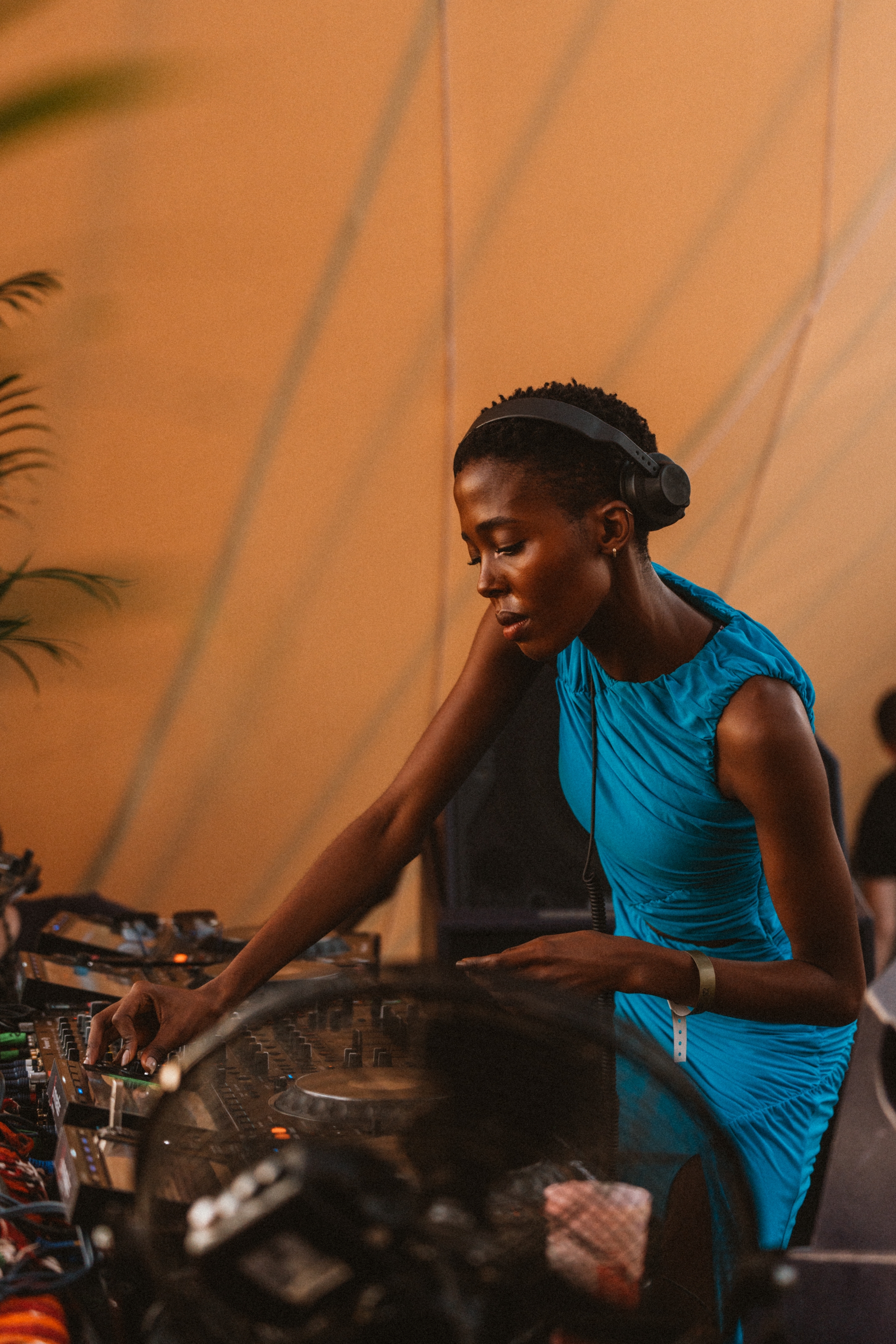
One of MOGA’s stand-out features was the SQALA stage, a new addition to the festival. Set alongside the stretch of long sandy beach with the Atlantic ocean as its witness, the SQALA stage was everything you want to see from a beach venue. Facing into the sunset, it was by far the best place to be during the festival’s golden hour which cast the entire site in gilded shades of yellow and amber. Though DOUKKALA was intended as the main stage, the sheer beauty of the SQALA’s surroundings drew crowds from across the site and overall three venues shared equal numbers across the weekend. The HAFLA stage was the only stage with a roof, offering a more intimate experience with a close-up view of the DJ and hardwood floors, which goes without saying, is easier to dance on than sand. That being said, the sand didn’t seem to deter any dancing, with many festival goers opting to go barefoot through the crowds, a testament to the respectful attendees that mostly kept the soft golden beach free from debris.
MOGA’s linen-draped sound seekers had a laidback air about them but that’s not to say they weren’t energetic. There was genuine enthusiasm during sets from the crowds and a noticeable lack of phones in the air, with the social and easy-going crowds immersing themselves in the music. The average age ranged between 25-35, a welcome demographic for those that wish to relax and enjoy the music, providing contrast to some of the younger rowdier crowds seen at some of the UK’s electronic festivals. With a three-day pass coming in at €165, the festival lands at an affordable price compared to many UK festivals. However, including travel and accommodation, the cost could rack up considerably. For locals, where the average income is €1,269 a month, the festival's cost is sizable. But with day tickets averaging around €60, it’s a fair price considering the quality of MOGA’s production and line-up.
Read this next: Lisbon's electronic music scene is stronger than ever
The festival’s cultural programme features several parties and cultural events in and around Lisbon — from free parties for the area’s lower-income inhabitants to art installations uniting local and Moroccan artists to kids parties, empowering local disadvantaged youth. MOGA acknowledges the responsibility and weight of throwing parties in today's climate. Referring to the cultural side of the program, Mattieu says: “For me, this is my pride”. This genuine desire to unite communities was felt from the first night of the festival, where during an OFF program activity, festival-goers were invited to learn about the local fishing communities in Caparica, followed by an intimate “family style” meal featuring the catch of the day. Today’s crowds party with a conscience and there is an acute awareness of the environmental and cultural impact of mass tourism in lower-income areas. The impact of tourism is a pertinent topic in the current climate where many holiday hot spots, such as Mallorca and Barcelona, are battling against being priced out of their own homes thanks to the rise of Airbnb and digital nomadism. However, when organisers are intentional about their impact, large cultural events such as MOGA can have a beneficial effect in bringing sustainable tourism, art and exposure to an area.
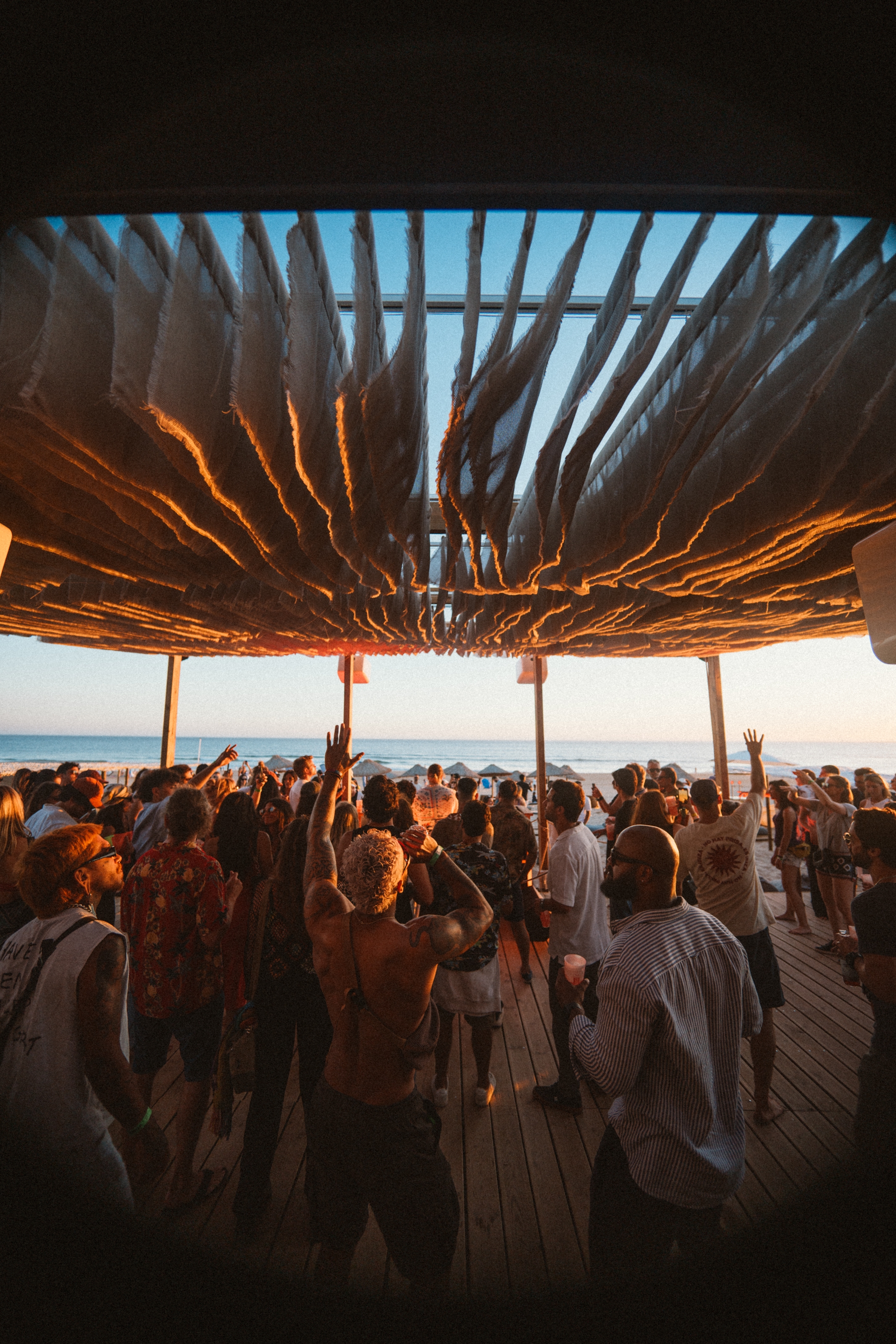
At the heart of Mattieu’s tale of MOGA milestones – its mythical origins in Essaouira, the unreplicable alignment of events leading it to Caparica – appears to be the essence of what makes MOGA special: its people. As with its founders, MOGA is bold and boundless. Each year the small but mighty festival has continued to expand and reinvent itself in meaningful ways, driven by the ambition, vision and creativity of its team.
With plans to continue evolving, Mattieu disclosed that MOGA is in talks about moving along Atlantic shores to land on Senegal’s beaches in the not-so-distant future. An exciting prospect indeed, given the high standard of previous editions. So what can you expect from MOGA? Sun, sounds, sea and scenery, yes but also so much more. At the heart of MOGA is its community; friendly, respectful crowds like you’ve never seen and quality production; with the festivalgoer's experience at its core and natural beauty beside the sensory sensation that is the Atlantic Ocean’s coastlines.
For more info on MOGA click here.
Belle Richardson is a freelance writer, follow her on Twitter


